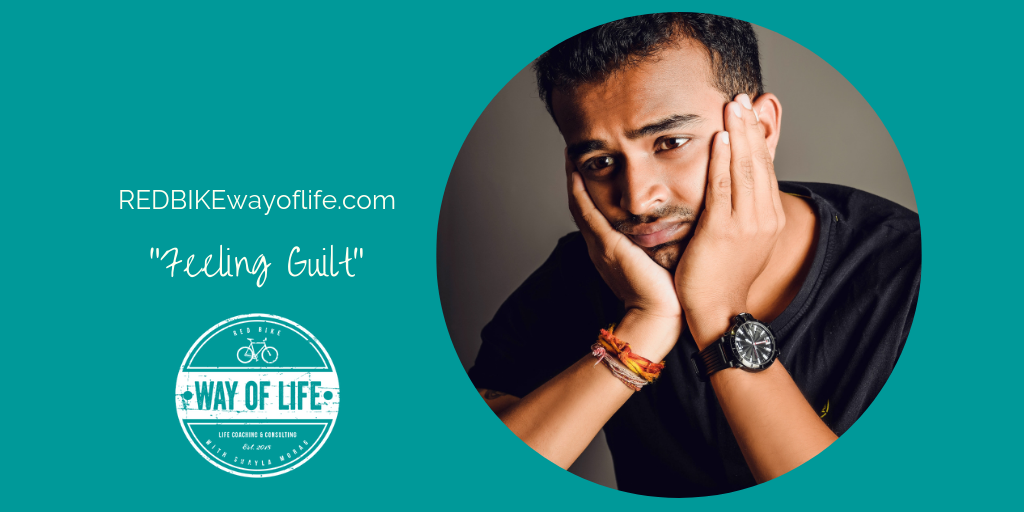
by Shayla Morag | Aug 15, 2019 | Emotional Intelligence, Forgiveness, Guilt, Self Care, Self-Compassion, The Red Bike Way
Feelings of guilt are distressing and draining. There doesn’t seem to be a cure. You’ve done or said something you regret. You’re uncomfortable without an obvious solution. What can be done about it now?
Get over your guilt with these strategies:
- Determine if you should feel guilty. Whose standards are you using? Your parents’? Your own? Your church’s? Can you be sure the source is correct? Ensure that you’re judging yourself by a set of standards you deem to be worthy. It’s your choice.
- Learn from it. Why do you feel guilty? Obviously, you did or said something that you consider to be wrong. Once you know why you feel guilty, you’re in a position to benefit from it. Ensure that you don’t repeat the behavior in the future.
- Visualize yourself behaving in a new and improved manner.
- Sometimes guilt is unproductive. Imagine that you feel guilty about missing your child’s play because you were required to work. If you did everything within your power, there’s no benefit to feeling guilt. Does your behavior require modification? If not, there’s no reason to feel guilty.
- Apologize. It can be as simple as saying you’re sorry. You’ll feel better afterwards, even if your apology is rejected.
- Accept that you feel guilty. Acknowledge your feelings and the pain that goes with them. Accept that you made a mistake. Realize that it will pass.
- Forgive yourself. Even if the other person won’t forgive you, you can forgive yourself. Be kind and gentle with yourself. No one is perfect.
- Let it go. Once the event is over, you’ve apologized, and modified your behavior, let it go. At that point, what purpose does your guilt serve? Take a deep breath, let it out, and move on. Keep your mind occupied with more productive thoughts.
- Have gratitude. Rather than saying to yourself, “I should have told Mary the truth”, tell yourself, “I’m grateful I’ve learned the importance of honesty.” Negative experiences can still be worthy of gratitude.
Avoid guilt in the future:
- Think instead of react. Guilt is often the result of acting without thinking. When you become emotional, take a moment to collect yourself. It’s easy to do or say something that you’ll later regret.
- Be less critical of yourself. Guilt and the need to be perfect go hand in hand. Avoid expecting perfection. It’s unrealistic and leads to feelings of guilt. Everyone makes mistakes on a daily basis.
- Create realistic beliefs. Maybe you believe that a good parent should do certain things, but you don’t or can’t do them. Are you sure your opinion on the matter is reasonable? Maybe you believe that a good parent would never get frustrated, which is unrealistic.
You’re not alone in feeling guilty. Some people spend a lifetime wallowing in guilt. How long you feel guilty is up to you. Learn from your mistakes and go forward with a new perspective and strategy. Apologize and forgive yourself.
The real shame is repeating behavior that results in guilt. Avoid repeating your mistakes and be gentle with yourself. Practice making the choice that doesn’t result in guilt. The more you practice, the more healthy choices you’ll make, and the less guilt you’ll have to deal with.

by Shayla Morag | May 23, 2018 | Change, Comfort, Emotional Intelligence, Freedom, Mindfulness, Self Care, Self-Compassion, The Red Bike Way
There are some people that have no trouble sharing their feelings. They are devoid of the fear and anxiety that most of us feel about sharing something personal or potentially controversial. Down deep, you’re jealous of these people. Openness provides a level of freedom that eludes those that are more private. It’s important to be able to share your feelings and concerns openly.
Your concerns can’t be addressed if you’re unwilling to share them. You have to face your challenges alone if you keep them to yourself.
Share your feelings and enjoy the resulting freedom it provides:
1. Be more accepting of others. It sounds counterintuitive, but if you’re afraid to share your feelings, you may be judgmental of others. Naturally, you would expect others to judge you, too. It’s impossible to accurately judge others. There’s always more going on than you realize. Be accepting of others and you’ll expect others to be accepting of you.
2. Start small. Share something small, but relevant. Once you see that you can share your feelings without negative repercussions, you’ll be more likely to share them again.
3. Determine the source of your fear. You may fear judging, rejection, ridicule, or embarrassment. Perhaps attacking that fear is the first logical step to lessening your anxiety around sharing and openness.
4. Be brave. There’s no way to be 100% comfortable about sharing your feelings until you’ve done it several times. There’s a certain amount of courage required at the beginning. Be brave enough to share your feelings. It becomes easier over time.
5. Encourage others to share their feelings with you. You might feel more comfortable if your conversation partner goes first.
6. Stay in the present moment. You generate feelings of fear by worrying about the possible outcomes. Stay in the moment, and your fear will dissipate. Avoid imagining the worst possible outcome.
7. Calibrate the other person. Others are often careless when they believe something doesn’t matter. You’ll find that others are more empathetic and understanding if you let them know that something is important to you. It can be as simple as, “I want to tell you about something that’s important to me.” Put others in the proper state of mind before you share.
8. Be honest. The willingness to make yourself vulnerable will enhance your results. If you’re sharing something that displeases you about the other person, it’s important to empathize first. Sharing your feelings requires consideration of the other person’s feelings, too.
9. Take a deep breath and just do it. The anticipation is usually worse than the actual event. Sometimes, you just have to go for it. You can do it. Focus on how much better you’ll feel afterwards.
Change isn’t easy. Sharing can be scary, but the benefits outweigh the anxiety experienced. In time, you’ll learn to share your feelings and worries more easily. It just takes practice. Focus on the benefits you’ll receive and let the words flow. The other person will appreciate your effort and you’ll find that you get what you want more often.

by Shayla Morag | May 10, 2018 | Change, Comfort, Emotional Intelligence, Mindfulness, Patience, Persistence, Self Care, Self-Compassion, The Red Bike Way
There are times when we feel we have just had enough. Whether it’s a bad job, a family crisis, or a horrible diet, there are times we all consider quitting. Quitting isn’t always a bad choice. We’ve been taught to believe that quitting is synonymous with failure, but some activities or relationships aren’t worth continuing. It’s important to arrive at a decision to quit or continue consciously, rather than making a reflective decision.
Avoid quitting prematurely:
1. Hit the pause button. Most poor decisions could be avoided by taking a short pause. When you’re stressed, overworked, overtired, and fed-up, rash decisions become the norm. Give yourself the time you need to make a wise decision. Allow your head to clear before you make a decision that changes your life. Most decisions can wait.
2. View the situation objectively. Try to be objective and weigh the situation carefully. Enlist the help of a friend if necessary. It can be easier to evaluate someone else’s situation accurately than your own.
3. Consider the worst-case scenario. Think long-term. Quitting is an easy choice when you only consider the short-term ramifications. You can relieve your stress almost immediately! However, what are the long-term consequences? If you quit your job, what will happen if you can’t find another one?
- Reconsider quitting if the long-term consequences are too severe. A little relief now isn’t worth long-term pain.
- Who will be impacted by your quitting? Your boss? Coworkers? Family? The members of your church softball team? Who is affected?
- What message are you sending to your children? What would you recommend to a child in a similar circumstance? Your children are always watching. Be sure to set a good example.
4. Ask yourself if a new approach is warranted. Maybe you shouldn’t quit. Maybe you need a new plan. Not getting the results you desire isn’t necessarily a sign that you should call it quits. Poor results indicate an ineffective process. Perhaps all you need is a tweak to your approach. Major accomplishments are accompanied by numerous failed attempts.
5. Ask yourself why you’re considering quitting. Is it because you don’t believe you can be successful? You don’t have the resources you require? Do you not enjoy the job, activity, or relationship in question? Are you lacking the necessary time?
- Some reasons for quitting are better than others. Quitting a second job you don’t need so you can spend more time with your children is a good reason to quit. Ending your marriage because your spouse won’t pick up his dirty socks might be a bit extreme.
- Is there another solution besides quitting?
6. Consider the times you’ve given up in the past. How do you feel about those events today? Was quitting a good idea or do you regret it? How are you likely to feel in the future about quitting in your current situation?
7. Sometimes it’s necessary to lower your head and keep going. There are times when quitting is the best choice. However, when it’s not the best choice, it’s necessary to be strong and keep going. Stick with that horrible job until you have something else lined up. Give counseling a try before quitting on another relationship.
- If your default coping mechanism is quitting, you’ll never accomplish anything.
Take a moment before making a hasty decision. Quitting isn’t to be taken lightly. Before making the decision to quit, consider the consequences, consult with a trusted friend, and consider your history. In some instances, quitting is final. Avoid creating long-term challenges to alleviate stress in the short-term. Give yourself the time you require to make a wise decision.

by Shayla Morag | Apr 21, 2018 | Emotional Intelligence, Grief, Mindfulness, Self Care, The Red Bike Way
Finding inner peace in the modern world is a significant challenge especially after experiencing loss and grief. Everything about modern society feels like an obstacle to experiencing peace of mind. But there are ways to find and maintain inner peace. Inner peace is a choice, and many of your habits determine how much peace you experience in your daily life.
Experience these 9 calming strategies that help find inner peace and enjoy life on a deeper, more satisfying level:
1. Focus your attention on those things you can control. Why worry about those things you can’t control? It sours your mood and makes you less capable. Literally ask yourself, “Is this something I can control? Will worrying be beneficial in any way?”
2. Spend time in nature. The original humans didn’t live in a 3-bedroom ranch and eat microwave popcorn. Take a long walk in the park or spend a weekend camping. You’ll feel dramatically different compared to sitting in a building 24 hours every day. There’s something peaceful about spending time among the birds and the trees.
3. Be true to yourself. Few things are more disconcerting than living a life you weren’t meant to live. It continuously gnaws away at you. Live a life that’s congruent with your values. It’s too easy to allow society dictate your choices. You don’t have to spend your life on a career that’s impressive to others. You don’t have to chase after a fancy house. Make your own decisions about what’s most important to you.
4. Eat nutritiously.You might not realize how bad you feel because you’re so used to it. Try eating the way you know you should for just a week. Note the change in how you feel. Now try eating some junk food and see what happens to your mood and your overall sense of well-being. You’ll feel like you’ve been run over by truck.
5. Exercise regularly. Have you ever noticed how great you feel as you’re walking out of the gym? Exercise feels good, and you feel good about yourself for doing it.
6. Do something nice for someone else. This is a great way to take your focus off of yourself. You become more aware that others are struggling, too. When you are kind, you receive kindness in return. You’ll also feel a sense of pride and satisfaction when you help someone else.
7. Be assertive. Be open and forward with your needs and desires. You’re not only more likely to get what you want, but you’ll also feel more in control of your life. Being passive results in having less control, which runs counter to inner peace. Be bold without being aggressive.
8. Meditate. Meditation is calming. It also helps to see life and its challenges more accurately. Things are often better than they seem. Meditation can prevent your mind from making a situation seem worse than it really is.
9. Avoid trying to change others. You’ll have as much success trying to change the weather. It’s hard enough to change yourself. How will you ever manage to change someone else?
It’s important to take care of yourself mentally and physically. Eat properly, exercise, and be true to yourself. Be assertive and take control of your life. All the accomplishments in the world can’t replace inner peace. Avoid chasing after those things that society has determined to be important. Decide for yourself and live the life you were meant to live.

by Shayla Morag | Apr 03, 2018 | Change, Emotional Intelligence, Manifesting Life, Self Care, The Red Bike Way, Wise Words
Some beliefs have the power to stop you in your tracks. If you believe that you could never run a marathon, you will never try. Some toxic beliefs can permeate multiple areas of your life. These beliefs are more damaging than specific beliefs. Believing you can never learn to play the banjo doesn’t have the same negative impact as the belief that you’re too old to follow your dreams. Rid yourself of the 5 toxic beliefs that limit your life:
1. It’s too late, or I’m too old. Sometimes it is too late. You’re probably not going to start playing in the NHL if you’re 43 years old. But the number of things you can do is far greater than the number of things you can’t. Colonel Sanders didn’t settle on a chicken recipe until he was 49 years old. Yet, you know who he is and you’ve eaten his chicken. There have been a few medical students that didn’t get started until their 60’s. Avoid jumping to conclusions regarding your age. You can do a lot more than you think.
2. Failure is bad. Failure is normal. If you’re living, you’re also failing from time to time. The trick is to fail in the right way and make good use of it. Failure is nothing more than an undesired result. Take the opportunity to learn from your failures and adjust your approach. If one way doesn’t work, try another. If you continue to improve your method, how can you possibly fail over the long haul?
3. The past equals the future. You have an amazing ability to change and adapt. Just because you’ve been lazy, made poor choices, been uneducated, had poor social skills, or self-destructed in the past doesn’t mean the future can’t be different. The past only affects you if you permit it. You can choose to drop the past and live in the present.
4. People will criticize me, laugh at me, or think little of me. You’re right. They will. This isn’t an inaccurate belief, but it’s harmful to be concerned about the opinions of others. No matter what you do, there are people that won’t be impressed. And there’s always someone ready to make a negative comment. Why do you care? You don’t have time to worry about such silliness. You’re no longer in high school, so let go of the peer pressure. Please yourself and avoid worrying about anyone else’s opinion.
5. I’m not smart, good with money, good with people, educated enough, special, or No one is good at everything. You can learn to be good at whatever skill you’re lacking. Don’t know how to save money? Read a book. Not good with people? Take a class. Lacking in real estate knowledge? Find a mentor. Successful people are often surprisingly ordinary. You don’t have to do anything spectacular to have spectacular results. You can find or create whatever you’re currently lacking.
A toxic belief could be holding you back from the success you deserve. These negative beliefs are difficult to recognize because you’ve been carrying them around for so long. Do a personal inventory and evaluate all your beliefs that inhibit you. How do you know they’re true? What are they costing you? Get rid of them and proceed to bring your dreams to life!

by Shayla Morag | Mar 05, 2018 | Courage, Emotional Intelligence, Grief, Self Care, The Red Bike Way
When it comes to loss and grief, your parents may have told you something they believed to be true, but wasn’t. You may have had a single experience that led you to draw a false conclusion. Contemplate what you believe about life and yourself that might not be true. False beliefs can greatly limit your options. It could change everything if you actually knew the truth! You might think that you’re not good at sports or public speaking. You might believe that you’re not talented or that nothing you do is good enough. It’s time to show yourself that many of your beliefs are inaccurate. One of the best ways to find and eliminate false beliefs is through experimentation.
Follow this process:
1. Make a list of your limiting beliefs for which you don’t have significant proof. Significant proof is repeated personal experience. One experience doesn’t prove a thing. Even two experiences can just be a coincidence. Get some real proof.
2. Start with a limiting belief that you can test easily. Maybe you believe that you can’t make friends. This might be based on the experience of not having friends in your younger days.
3. Learn what you need to know. Do you know how to make friends? It wasn’t covered in school. You might need to purchase a book and educate yourself. Maybe your social skills are a little rusty. Perhaps you need to work on minimizing your social anxiety.
What do you need to learn or do to put yourself in the position to test your false belief fairly?
4. Practice. If you believed that you couldn’t learn to play the violin, you wouldn’t prove it to yourself by picking up a violin for the first time and giving it a whirl. It takes practice to test your belief.
Likewise, you can’t prove to yourself that you can’t make friends by just walking up to a single person and saying, “Do you want to be my friend?”
5. Practice your social skills. Get out of the house and practice interacting with others. Learn how to maintain a conversation. Learn how to be more charismatic. Learn and then practice. Then practice some more.
Engage in your interests with others. Join a yoga class or a weekly poker game.
6. Test yourself. Make the test fair.
Give yourself 30 days to make at least one friend. You don’t have to make 20 friends. The whole premise was that you can’t make any friends. One friend would prove that belief to be false. If you can make one friend, you can make two. If you can make two, you can eventually make 50.
7. Keep your expectations realistic. You’re probably not trying to prove to yourself that you’re the best in the world at something, merely that you’re competent.
For example, most people only have a few close friends. It’s not reasonable to expect that you’re going to find 10 in the next 30 days.
8. Adjust your beliefs. With the proper preparation, you’ll find that 99% of your limiting beliefs are false. Once you’ve proved yourself wrong, be willing to adjust your beliefs accordingly.
Now go tackle another one. Challenge your limiting beliefs one by one and decide whether or not they’re true. Use your own personal experience. Test your assumptions whenever you have the chance. You’re likely to discover a whole new world of skills and experiences that you enjoy.







